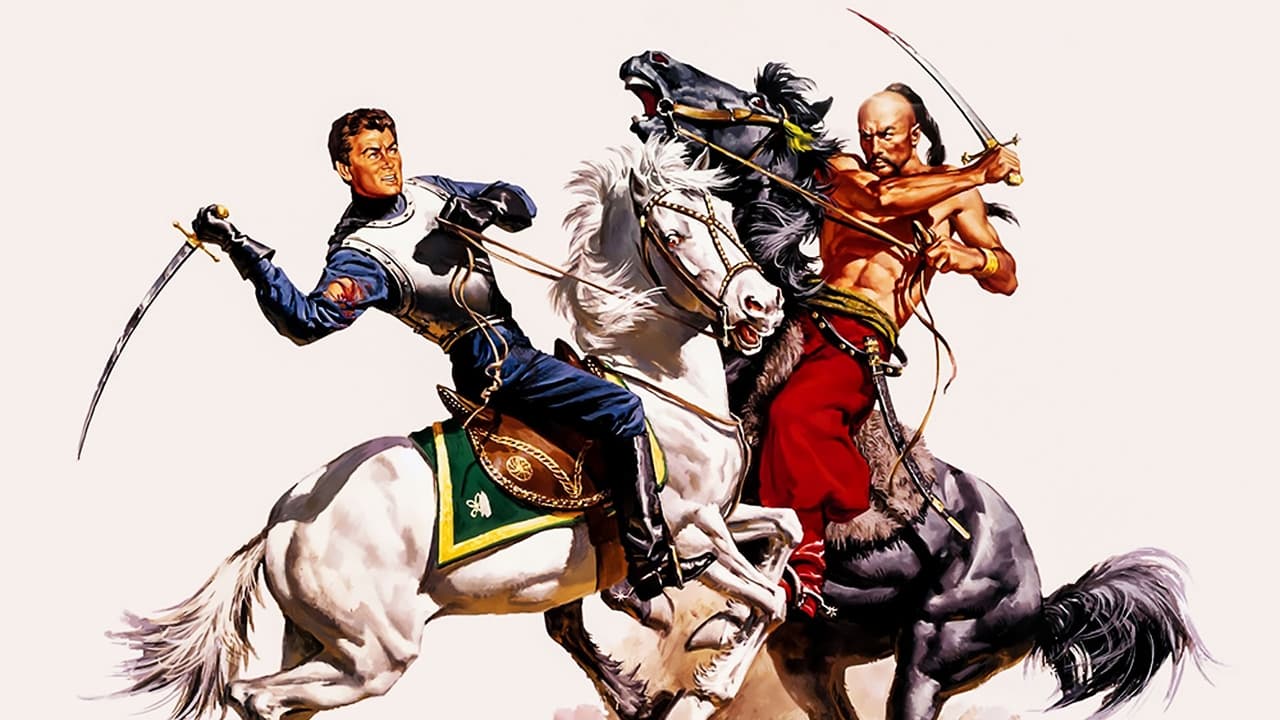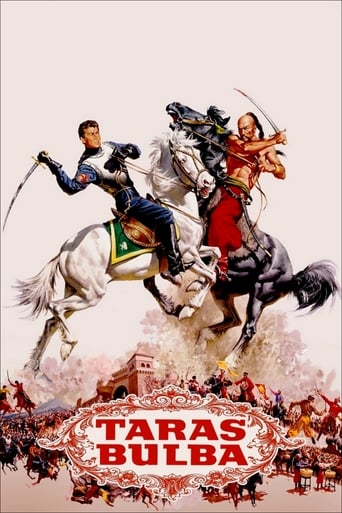

One of the best films i have seen
... View MoreBest movie ever!
... View MoreWhile it doesn't offer any answers, it both thrills and makes you think.
... View MoreOne of the best movies of the year! Incredible from the beginning to the end.
... View MoreThis movie was quite interesting from the history angle and also had me in anticipation for several of the scenes.Best scenes: --The joining of Cossack brigades as they join forces to attack the Poles. Great cavalry spectacle in a great scenic setting. --The "dual" between Tony Curtis and the big Cossack where they both have to jump the gorge on horse until someone dies. --The Polish battle around the castle near the end.Predictable Script: --The Tony Curtis love angle with the Polish nobility woman.Unpredictable: The punch line between Tony and Yul. nuff said.
... View More... even as a Coassack! Seriously though Mr. Brynner can play everything, as far as I'm concerned, and that in a very convincing manner, too! But although the film is called "Taras Bulba", it's actually son Bulba, who's playing the main character here (portrayed by Tony Curtis).I had the opportunity to watch the movie in a (blow-up) 70mm copy. Unfortunately the colors had faded away, but it still looked great. The battle scenes are especially good. But it's the nature of the movie that I liked, the depiction of a small group of "rebels" that tried to go a different way (if you see the movie, you'll know what I mean). There's a great quote from "Bulba Sr." (Brynner) about having faith in poles, just awesome!
... View MoreAlthough the famous Nikolai Gogol novel, Taras Bulba, was filmed many times, this version starring Tony Curtis and Yul Brynner is the best known at least in the USA. It's an exciting portrait of 16th century Ukraine under the then powerful kingdom of Poland. What's strangely muted in this version though is the religious angle. The Poles are Roman Catholic and the Ukranians are Russian Orthodox, it's a very big part of the reason for the resentments shown here yet we never see the religious beliefs portrayed for either group. Not sure why the script didn't include it.As rulers the Poles hire out the Cossack Ukranians who in today's terminology might be considered a paramilitary outfit to fight off the Ottoman Turks and then turn on them. Yul Brynner as one of the Cossack brigade commanders lops off the right hand of Guy Rolfe, the Polish prince in retribution, but that hardly satisfies. He goes back to the steppes of the Ukraine and awaits a time for some real payback.In the meantime he fathers two sons, Tony Curtis and Perry Lopez, who both inherit their father's geopolitical views. Brynner sends them off to school in Poland to learn all the Poles know.While there Curtis falls in love with a Polish princess Christine Kauffman. It's the beginning of his downfall as a Cossack.In his memoirs Tony Curtis says that Yul Brynner was a strangely aloof character with a sort of self imposed grandeur about him in his manner. But that Taras Bulba was a part he was born to play. I certainly can't visualize anyone else in the role, including Burt Lancaster who originally had the screen rights then gave them to Tony Curtis when he couldn't do the film. Of course Brynner being in the title role might have had some resentments to being second billed to Curtis, but Curtis in fact as a co-producer and he who produces decides billing.Curtis also mentions that on the Argentine pampas location away from American laws, the long banned 'flying W' was used in the filming of the battle and charge scenes and many horses were killed. He also mentions that with production overrun costs and accountants ripping him and the film company off what started as a three million dollar film became a nine million dollar film and Taras Bulba in theatrical release barely cleared ten million.However Tony did get a second wife out of the film. Christine Kauffman became the second Mrs. Tony Curtis after the film. Curtis says that Christine did not break him and Janet Leigh up, that things were over before he met here, still that was the common gossip back in the day.Director J. Lee Thompson made great use of the Argentine pampas standing in for the Ukraine steppes and one does get a feel for the Cossack love of the land the freedom of the wide open spaces. Cossack stories in the Ukraine are just like our American westerns. Those people for all their faults settled and conquered much of what is now Russian Federation.As a bonus Franz Waxman's musical score which did earn Taras Bulba it's only Academy Award nomination is really quite rousing. We get to hear Yul Brynner sing in this film which is a treat, a Cossack drinking song. And the love theme for Curtis and Kauffman, The Wishing Star, is a very beautiful song that Tony Martin put on an album of film songs he did at the time.Ukranian Americans loved this particular film for which I can personally attest. I think others will as well.
... View MoreWhat could have been one of the strongest epic films of the early 60's is weakened by the miscasting of Curtis, a few studio-imposed cuts and some really juvenile-looking matte work in the city scenes. Brynner plays the title character, a Cossack warrior, fighting against the more civilized Poles who rule over the territory in which he lives (the Steppes.) For a time, the two peoples exist in a sort of peace, but eventually the restless and proud Cossacks tire of the oppression they feel from the Poles and a major conflict arises. Unfortunately for Brynner, he has shipped his sons off to Kiev in order to educate them in the civilized Polish ways and, not only has the education had an affect on one son's (Curtis's) thinking, but Curtis has fallen for a young noblewoman (Kaufmann) and this later complicates things greatly when the war erupts. Brynner felt more deeply about this role than practically any other in his career (including The King of Siam) and he immersed himself in it fully. Though he complained about the editing of his performance, he is clearly perfect for the part and does an admirable job. He took an extra $100,000 to soften the blow of second-billing to Curtis and it was that casting that throws the film off track. Aside from the fact that Brynner and his olive-skinned wife would hardly have produced a son with pool-blue eyes, a pompadour and a Brooklyn accent, Curtis adopts an acting style that is wildly erratic. Though he clearly tries to bring depth and passion to the serious scenes (with middling results), he offers a quirky, irreverent take during other scenes and this seems both out-of-place and cheap in the midst of the serious goings-on in the story. Kaufmann (only seventeen at the time of filming, but already a ten-year veteran of the cinema!) is lovely and cries beautifully, but that's almost all she is ever given to do. She and Curtis make an attractive and appealing couple, but their relationship is never as realistic or as fleshed-out as one might hope. (They fell in love during the filming and married soon after in real-life.) Other notable cast members include a nearly unrecognizable Dexter as Brynner's brother, razor-thin Rolfe as the chief Polish antagonist, MacCready as Kaufmann's stern father and Rust as her handsome, but detestable, brother. Rust is so mysterious and captivating in his few brief moments that one longs to have seen more of him. His career seems to have been stifled by type-casting as unsympathetic henchmen (see "Walk on the Wild Side" for more of him.) A truly marvelous score by Waxman is reminiscent of "The Sabre Dance" at times. It adds considerably to the film. What hurts is the focus on Curtis over Brynner and the cuts that were made in order to whittle this gigantic story down to a movie that could play three times an evening. Also, the sets and backdrops for Kiev look like something more suited to "The Student Prince" or "The Pirate" than a serious story like this. A few unfortunate rear-projection shots mar a few of the outdoor riding scenes as well. Though a few changes were made from the source novella, the story adheres fairly closely to the original. One thing that stands out here is an unintentional (?) homoerotic subtext. Brynner and Curtis can't keep their hands off each other and are often hugging, kissing, wrestling and even caressing in some scenes! Curtis and his brother sleep in a dormitory with many athletically-built students in skimpy pajama shorts and both gentlemen are stripped and whipped frequently. It's an imperfect film, but an interesting one with many virtues, many of which have been buried in the bad reviews and lost sands of time. A widescreen DVD would surely grant the movie more attention as it contains massive spectacle with the Argentine Army pitching in to make sure the battle sequences aren't puny looking. There's a lot worse out there in the way of historical epics than this.
... View More